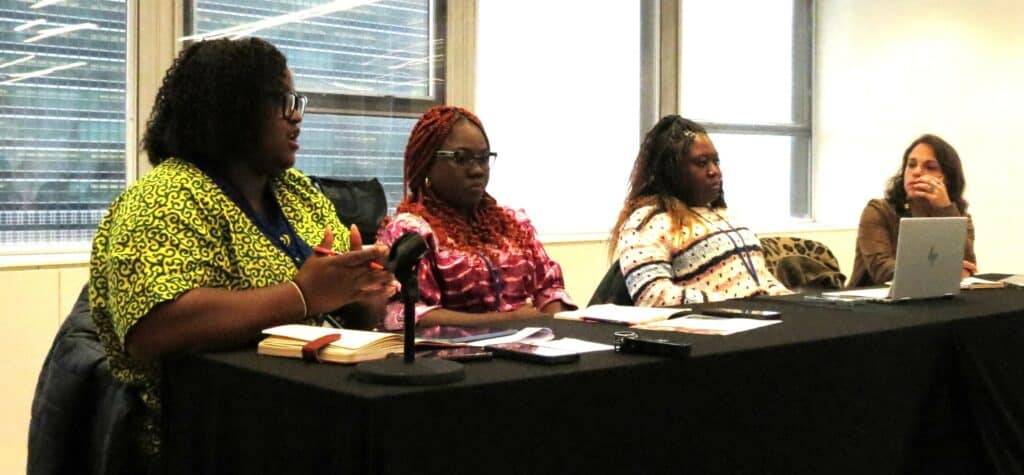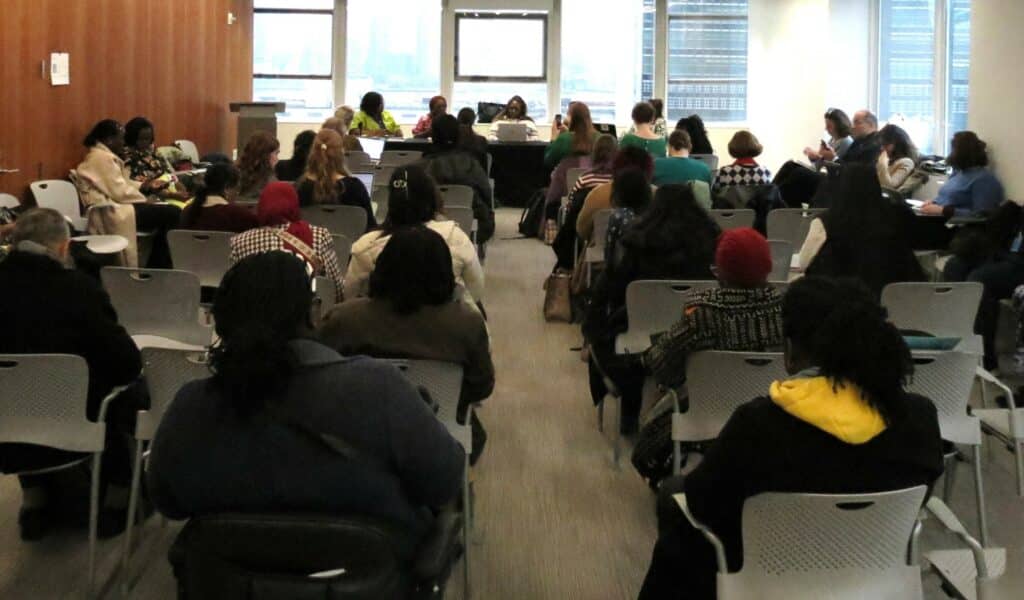In a time characterised by growing economic inequalities, Feminist Economic Realities (FER) provide a novel framework for systemic transformation, emphasising care, collective welfare, and gender justice. At the 69th Session of the Commission on the Status of Women (CSW69), we hosted a side event titled “Beijing+30: Where Are We Now, and Where Do We Want to Go on Economic Justice and Rights? An Exploration Through Feminist Economic Realities,” together with a dynamic group of feminist advocates, scholars, practitioners, and community leaders. Their shared vision was clear: a just and inclusive economy requires dismantling entrenched power structures and redistributing resources to uplift women, girls, and structurally excluded communities.
Feminist economic realities lack the recognition they deserve. Consequently, we organised this event to demonstrate FER’s capabilities and potential. Hind Hamdan, a gender and socio-economic specialist from Lebanon, opened the event with a compelling statement. She underscored the pressing need to dismantle existing economic institutions perpetuating inequality and establish new frameworks supporting feminist economic realities. Hamdan’s poignant account of M Jamil from Gaza highlighted the resilience and strength of women who face multiple forms of discrimination, especially those in conflict zones:
“Every time she was displaced, she would plant seeds of vegetables and herbs. In that way, she was able to sustain herself and her family and to find purpose amid all the chaos.” – Hint Hamdan about M Jamil from Gaza


Daphne Jena, from the Urgent Action Fund – Africa, connected the Beijing Declaration to feminist economic realities. She proceeded to elucidate the fundamental pillars of the feminist economic realities framework. She presented concepts that may initially seem lofty or abstract, making them concrete through examples from various regions of the African continent. The connection between individuals and the environment highlighted the interconnectedness of social and ecological systems, while emphasising fairness across policy domains that necessitated reevaluating laws, budgets, and institutional standards to effectively combat prejudice and inequality. Daphne’s address centred on acknowledging and appreciating the unrecognised labour of women, serving as a clarion call for both politicians and communities to abandon complacency towards underpaid and unpaid care, viewing it as a fundamental and quantifiable aspect of the economy. She emphasised the importance of value-based systems and economic activities that are not exploitative.
Brigitte Tsonya-Acakpo Addra, an environmentalist from Togo, emphasised the crucial role of women in attaining food sovereignty and sustainable land governance. She critiqued how neo-colonialism and globalisation facilitate exploitative resource exploitation and jeopardise the welfare of local populations. Her appeal to action was unequivocal: in the absence of strong legislative measures that safeguard land rights and promote community-based agriculture, women remain susceptible to economic instability.
Brigitte continued by narrating a revolutionary instance: women in her village who obtained land rights and revolutionised local agricultural techniques, generating employment while safeguarding traditional ecological knowledge. These narratives function as a conceptual framework for extensive legal reforms designed to guarantee women’s ownership and management of land.
“We are looking at a framework that gives feminist solutions to women’s economic rights.” – Daphne Jena
Sevidzem Ernestine Leikeki, co-founder and Women and Gender Officer of Cameroon
Gender and Environment Watch (CAMGEW) addressed the barriers women face in land ownership due to customary laws and economic disparities. She highlighted the importance of community awareness and education to promote gender equality in land management. Sevidzem shared her organisation’s work in policy advocacy, capacity building, and engaging local leaders to challenge discriminatory cultural laws. She emphasised the need for economic empowerment and support for displaced women to ensure their land rights are protected.


Nicole Mumala Maloba, a feminist political economy practitioner from Kenya, illustrated a world where market-driven forces permeate all strata of society, often imposing a particularly severe burden on women in developing economies. This included how exploitative lending and predatory microfinance practices trap women in debt cycles that diminish their autonomy, commodify their labour, and undermine their caregiving efforts. Nicole argued that conventional financial institutions have been shaped by profit-oriented principles that disregard and even erode the social fabric of communities. She advocated for a transformative shift: public investment in social infrastructure, healthcare, education, social protection mechanisms, and care societies to ensure that essential services remain accessible to everyone, rather than becoming luxuries for an elite minority.
Nicole Maloba stated, emphasising the need for systemic change:
“We need to decolonise our minds and change the way we’ve been conditioned to think about financing.” Nicole Maloba
The event’s concluding Q&A demonstrated extensive backing for a legislative agenda that tackles women’s intersectional realities. Participants from many locations emphasised the necessity for specific legal reforms, augmented public financing for social services, and, importantly, strong enforcement measures to guarantee that rights on paper result in tangible benefits. In her closing remarks, Hind Hamdan emphasised that envisioning an equitable economy starts with community, collective care, and a common vision. Feminist Economic Realities, rooted in human rights and social justice, necessitate ongoing legislative advocacy and concrete resource reallocation. Only then can we establish an economic system that prioritises care, dignity, and well-being for all.
*The event “Beijing+30: Where Are We Now, and Where Do We Want To Go on Economic Justice and Rights? An Exploration Through Feminist Economic Realities” was organised by CMI’s Feminist Economic Realities (FER) working group during CSW69. To learn more about the work of this group, click here.